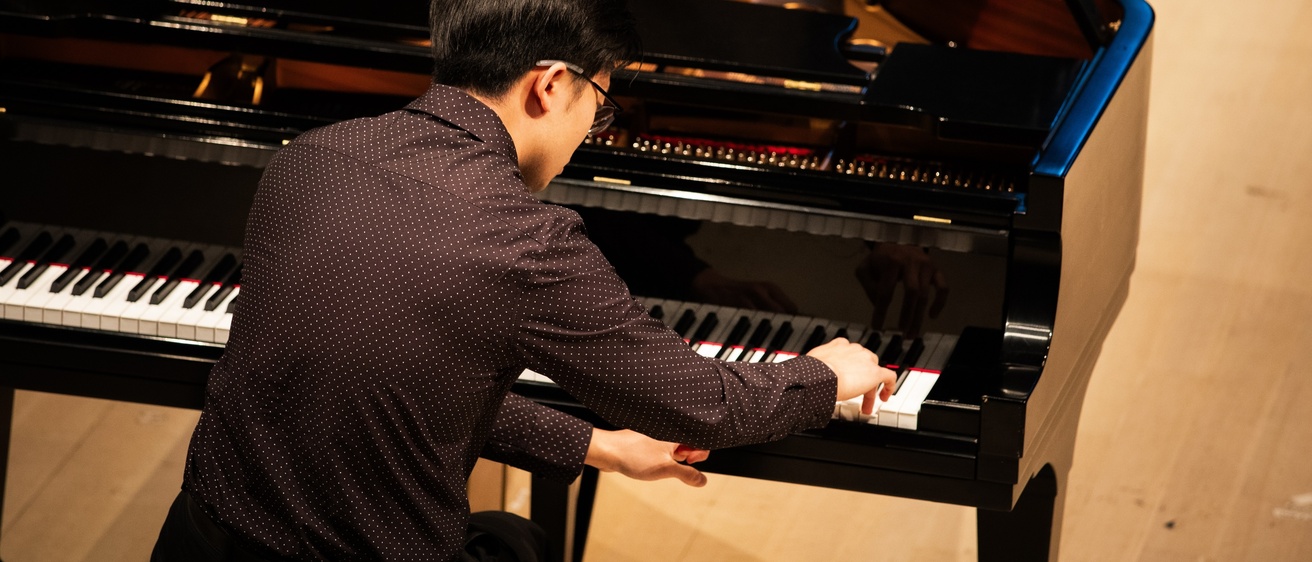Main navigation
Earn your DMA in Piano
The piano area at the UI School of Music is vibrant with artist-teachers who are active as soloists, chamber musicians, collaborative pianists, recording artists, clinicians, authors, and lecturers. Dedicated to a comprehensive and versatile educational approach, the we offer intensive instruction. The graduate program is among the most substantial in the U.S. and prepares students for rewarding careers in both teaching and in performance. The piano area is known for the personal attention students receive, supporting the individual musical interests of each student within the program of study.
The University of Iowa School of Music and our state-of-the-art Voxman Music Building offers excellent facilities for pianists. We offer one of the best maintained stable of over 90 Steinway grand pianos, extraordinary recital and recording spaces, world-class acoustics, and beautiful rehearsal spaces. Our teaching assistants enjoy large offices, which are only shared with one other TA.
Requirements and program planning
This information is intended to assist in your course planning but is not intended to serve as an official guide to graduation requirements. To confirm progress toward graduation, you should consult your advisor.
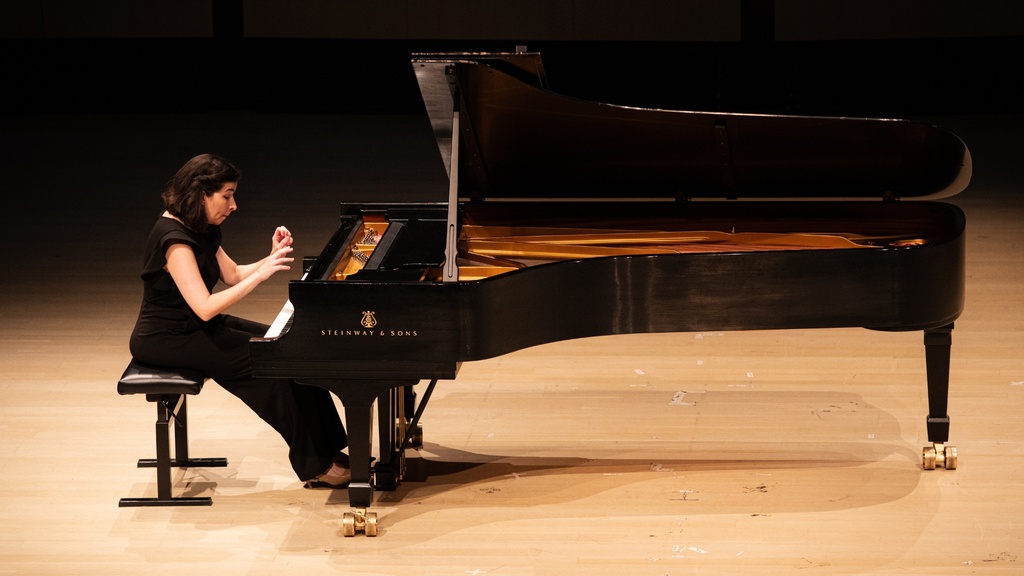
Performance
Degree for accomplished pianists, focused on high-level performance, teaching, and related academic work
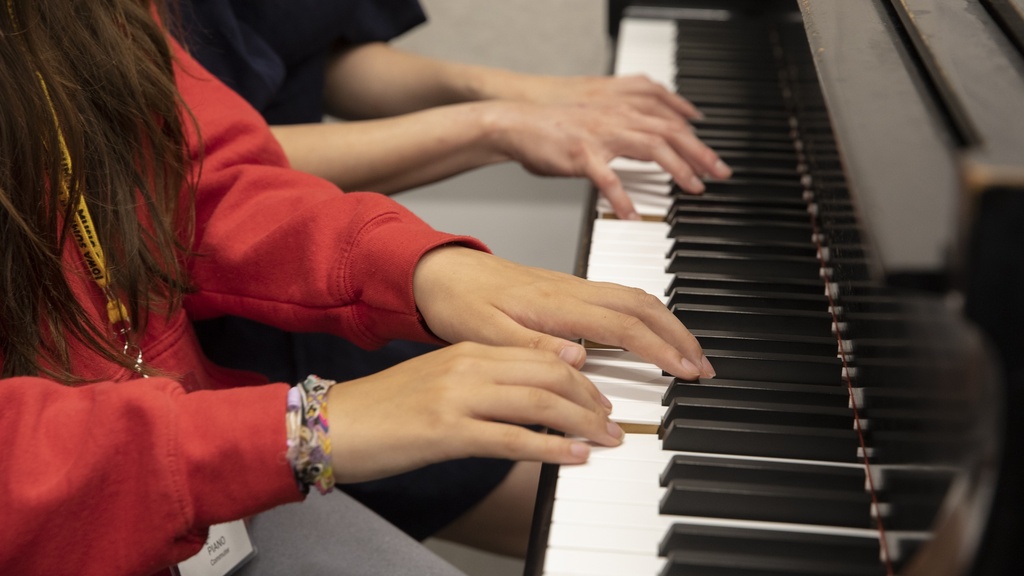
Pedagogy
Combines advanced piano performance, literature, and theory with a focus on the art and science of teaching piano
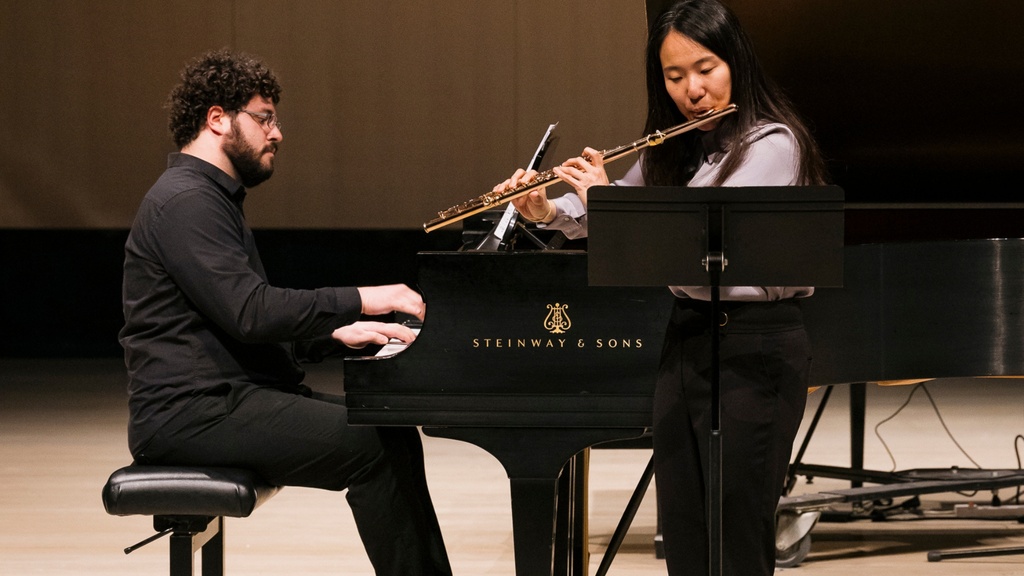
Collaborative Piano
Degree focused on the highest level of excellence in performance in partnership with other performers
General requirements
- Introduction to Graduate Study in Music (MUS:5300), 2 semester hours
- Seminar in Music Research (MUS:7410), 2 semester hours
Music theory requirements
Students exempt from MUS:5200 through the advisory examination in music theory must complete 9 semester hours from the following:
- Counterpoint Before 1600 (MUS:4200), 3 semester hours
- Counterpoint After 1600 (MUS:4201), 3 semester hours
- Jazz Theory (MUS:4730), 3 semester hours
- Tonal Analysis (MUS:5235), 3 semester hours
- Non-Tonal Analysis (MUS:5236), 3 semester hours
- Analysis of Popular Music (MUS:5237), 3 semester hours
- Special Topics in Theory and Analysis (MUS:5240), 3 semester hours
- History of Ideas in Music (MUS:6210), 3 semester hours
- Theoretical Approaches to Music (MUS:6211), 3 semester hours
- Theory Pedagogy (MUS:6215), 3 semester hours
- Advanced Tonal Theory and Analysis (MUS:6250), 3 semester hours
- Advanced Non-Tonal Theory and Analysis (MUS:6251), 3 semester hours
- Advanced Theory and Analysis of Popular Music (MUS:6252), 3 semester hours
Music history requirements
Select from the music history courses in the following list. Only one 4000-level course (taken at the University of Iowa or equivalent transferred in from another institution) may count toward the 9 semester hours required:
- Music and Gender (MUS:4320), 3 semester hours
- Medieval and Renaissance Music (MUS:4325), 3 semester hours
- Baroque Music (MUS:4330), 3 semester hours
- 18th-Century Music (MUS:4335), 3 semester hours
- 19th-Century Music (MUS:4340), 3 semester hours
- 20th-Century Music (MUS:4345), 3 semester hours
- Advanced Jazz History (MUS:4350), 3 semester hours
- American Music (MUS:4355), 3 semester hours
- Jazz Matters (MUS:4360), 3 semester hours
- Studies in Film and Music (MUS:4610), 3 semester hours
- Teaching Music, History, and Culture (MUS:6305), 3 semester hours
- Topics in Musicology (MUS:6310), 3 semester hours
- Historical Approaches to Music (MUS:6312), 3 semester hours
- Topics in Ethnomusicology (MUS:6314), 3 semester hours
- Foundations of Ethnomusicology (MUS:6315), 3 semester hours
- Renaissance Music Notations (MUS:6326), 3 semester hours
- Music Editing (MUS:6375), 3 semester hours
Performance piano area requirements
- Graduate piano lessons (MUS:6021), 12 semester hours
- Note: 6 semesters required, 2 semester hours each
- Applied lessons are taken each semester until the recital requirement is completed; requests for exceptions must be approved by the piano area.
- Ensemble requirement; 4 semesters chosen from the following:
- Piano Accompaniment (MUS:3480), 1 semester hour
- Note: Required unless permitted by the piano area to advance to MUS:7401.
- Special Studies in Piano Accompaniment and Chamber Music (MUS:7401), 1 semester hour
- Note: 2 semesters required
- Piano Chamber Music (MUS:3481), 1 semester hour
- Note: 1 to 2 semesters
- Chamber Music Residency Program (MUS:3489), 1 semester hour
- Piano Accompaniment (MUS:3480), 1 semester hour
- Piano pedagogy; 2 courses required from the following:
- Methods of Teaching Piano (MUS:3400), 2 semester hours
- Special Studies–Piano Pedagogy (MUS:3990), 2 semester hours
- Piano Pedagogy I (MUS:5400), 2 semester hours
- Piano Pedagogy II (MUS:5401), 2 semester hours
- Piano literature; 2 courses required from the following:
- Piano Literature I (MUS:5410), 2 semester hours
- Piano Literature II (MUS:5411), 2 semester hours
- Special Studies Piano Literature (MUS:7400), 2 semester hours
- Specific performance requirements; recitals should include at least 55 minutes of repertoire:
- Qualifying Recital (MUS:7899), 0 semester hours
- Note: The qualifying recital may, at the discretion of the recital committee, also be counted as DMA Recital 1.
- DMA Recital 1 (MUS:7900), 2 semester hours
- DMA Recital 2 (MUS:7900), 2 semester hours
- DMA Recital 3 (MUS:7900), 2 semester hours
- Note: With permission of faculty, may be a lecture recital or may include a major chamber work.
- DMA Essay/Thesis (MUS:7970), 2 semester hour minimum to 6 semester hour maximum
- Note: If you started coursework prior to Fall of 2019, the range is 4 to 8 semester hours.
- Qualifying Recital (MUS:7899), 0 semester hours
Pedagogy piano area requirement
- Graduate piano lessons (MUS:6021), 12 semester hours
- Note: 6 semesters required, 2 semester hours each
- Applied lessons are taken each semester until the recital requirement is completed; requests for exceptions must be approved by the piano area.
- Ensemble requirement; 4 semesters chosen from the following:
- Piano Accompaniment (MUS:3480), 1 semester hour
- Note: Required unless permitted by the piano area to advance to MUS:7401.
- Special Studies in Piano Accompaniment and Chamber Music (MUS:7401), 1 semester hour
- Note: 2 semesters required
- Piano Chamber Music (MUS:3481), 1 semester hour
- Note: 1 to 2 semesters
- Chamber Music Residency Program (MUS:3489), 1 semester hour
- Piano Accompaniment (MUS:3480), 1 semester hour
- Piano pedagogy; 3 courses required from the following:
- Methods of Teaching Piano (MUS:3400), 2 semester hours
- Special Studies–Piano Pedagogy (MUS:3990), 2 semester hours
- Piano Pedagogy I (MUS:5400), 2 semester hours
- Piano Pedagogy II (MUS:5401), 2 semester hours
- Piano literature; 1 course required from the following:
- Piano Literature I (MUS:5410), 2 semester hours
- Piano Literature II (MUS:5411), 2 semester hours
- Special Studies Piano Literature (MUS:7400), 2 semester hours
- Specific performance requirements; recitals should include at least 55 minutes of repertoire:
- Qualifying Recital (MUS:7899), 0 semester hours
- Note: The qualifying recital may not be counted as DMA Recital 1 in this track.
- DMA Recital 1 (MUS:7900), 2 semester hours
- Note: Solo recital
- DMA Recital 2 (MUS:7900), 2 semester hours
- Note: Pedagogy workshop, must register with Dr. Huckleberry:
- 45 to 50 minutes in length
- 5 to 10 minutes of question and answer
- Note: Pedagogy workshop, must register with Dr. Huckleberry:
- DMA Recital 3 (MUS:7900), 2 semester hours
- Note: Lecture recital:
- Minimum 35 minutes of music
- Minimum 20 minutes of lecture
- Note: Lecture recital:
- DMA Essay/Thesis (MUS:7970), 2 semester hour minimum to 6 semester hour maximum
- Note: If you started coursework prior to Fall of 2019, the range is 4 to 8 semester hours.
- Qualifying Recital (MUS:7899), 0 semester hours
Recital, essay, and final examination
All doctoral committees shall consist of four faculty members. One of the committee members may be a non-tenure track/tenured faculty member.
A committee vote of 4-0 or 3-1 is considered passing. A committee vote of 2-2 or worse is considered not passing. Committee members (where applicable) will together decide upon the grade for the recital. If no consensus is achieved, then an average of all grades will determine the final grade.
All committee members are selected by the student and their advisor.
Committee compositions
- Qualifying recital:
- Four members of the piano area
- All other recitals/workshop:
- Two members of the piano area
- Two other School of Music faculty members
- Note: These can include other members of the piano area.
- Comprehensive exam:
- Two members of the piano area
- Secondary area advisor
- One other School of Music faculty member
- Note: This can include another member of the piano area.
- DMA essay, written option (final examination is an oral defense of the essay):
- Two members of the piano area
- Two other School of Music faculty members
- Note: This can include other members of the piano area.
- DMA essay, recording option (final examination is an oral defense of the recording and its accompanying document):
- Two members of piano area
- Two other School of Music faculty members
- Note: This can include other members of the piano area.
World language or secondary area of music
World language
French or German proficiency (other languages must be approved by the piano area). Students can satisfy the proficiency requirement in one of the following ways:
- Completion of the fourth semester of the language at the undergraduate level with at least a grade of B, within the last 10 years.
- Testing out of the fourth semester of the language at the University of Iowa. Placement exams in French, German, and Italian are offered each semester by the UI Examination Service, 300 Jefferson Building.
- Completion of graduate language courses French for Reading and Research (FREN:4911) or German Reading for Graduate Students (GRMN:5000)
- Note: Prerequisite is GRMN:1002, GRMN:1020, or GRMN:1010.
Secondary area of music
This option of the program is an opportunity for students to individualize their course of study according to their strengths, personal interests, and career aspirations. The secondary area will enhance their viability in the job market and broaden the student’s professional profile and competence.
The student, the major advisor, and a professor from the secondary area will define this individualized component of the DMA course of study by the end of the first year of study. A contract listing the required coursework or other specific outcomes will be filed with the student’s records in the Academic Office.
The required coursework will include a minimum of six semester hours. These hours may not include any courses required to fulfill other degree requirements. The student’s comprehensive examination committee will include a secondary area advisor, who will provide questions pertaining to the secondary area.
Possible secondary areas include conducting, music education, jazz studies, theory, music history, or a secondary applied area. Secondary areas may not be specialized areas of the primary performance/pedagogy or conducting area.
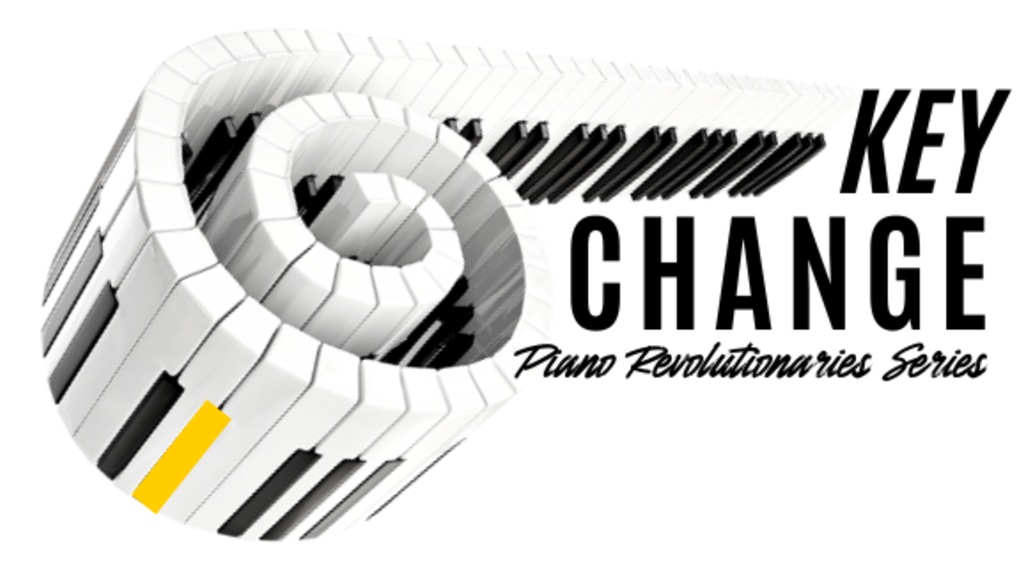
Key Change Piano Revolutionaries
Annual 7-concert series performed by UI distinguished piano faculty and their students, as well as guest artists from across Iowa.
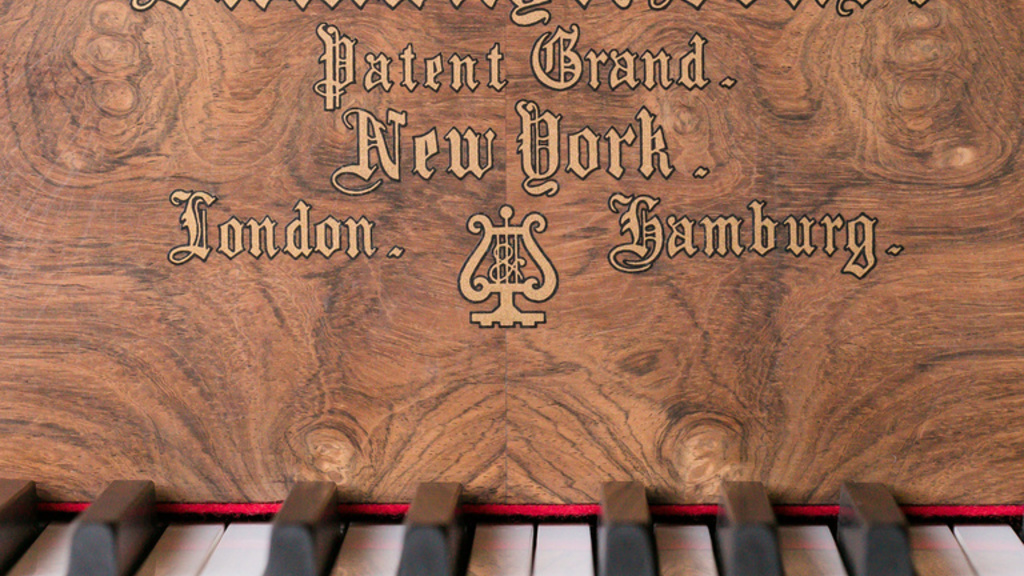
Piano Sundays
Performances by UI School of Music faculty and students in the Senate Chamber at the Old Capitol Museum. Concerts are played on the museum's 1878 Steinway concert grand piano.
Create your academic path
You'll find degree overviews, requirements, course lists, academic plans, and more to help you plan your education and explore your possibilities.
Current course list
The MyUI Schedule displays registered courses for a particular session and is available to enrolled students. The list view includes course instructors, time and location, and features to drop courses or change sections.
Add a minor
Any student admitted to a graduate degree program in the School of Music may add a theory pedagogy minor by completing the required courses.
Piano faculty
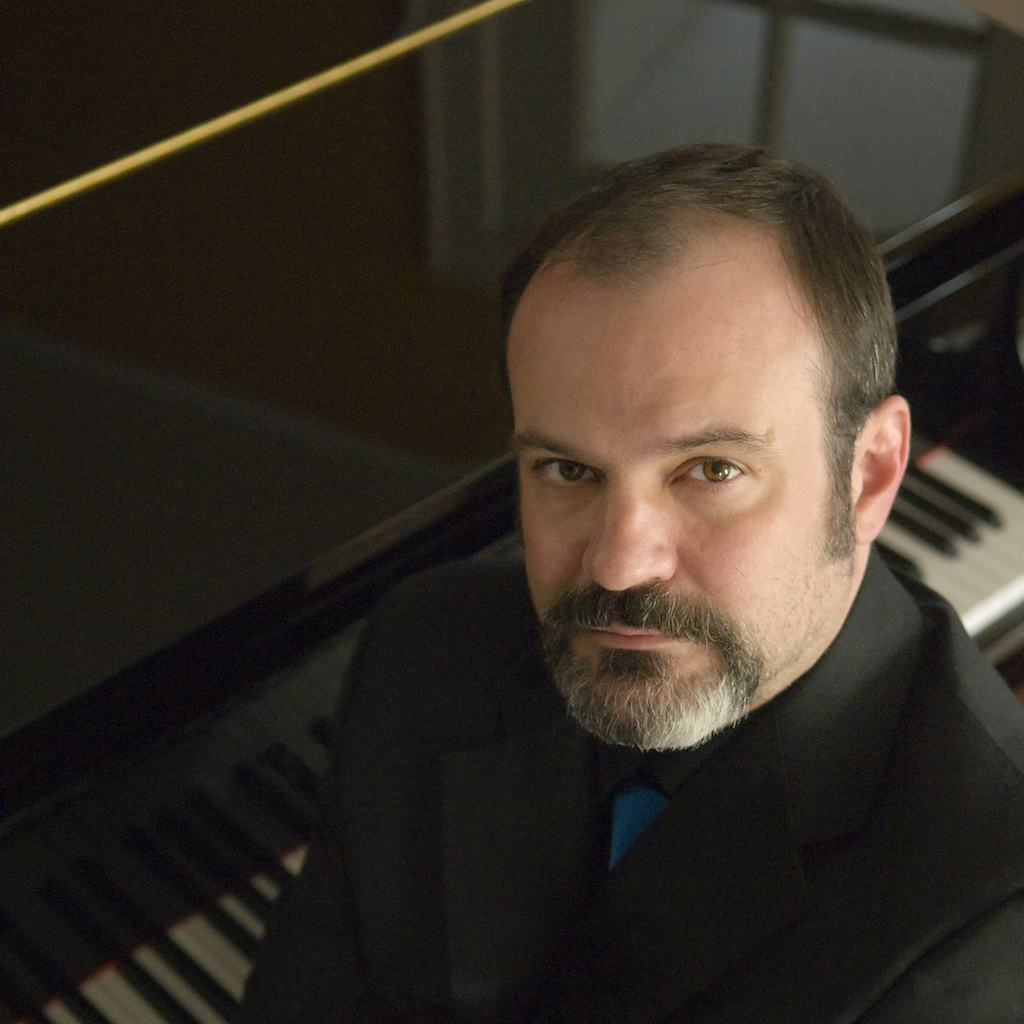
Alan Huckleberry

Réne Lecuona
Doreen Lee
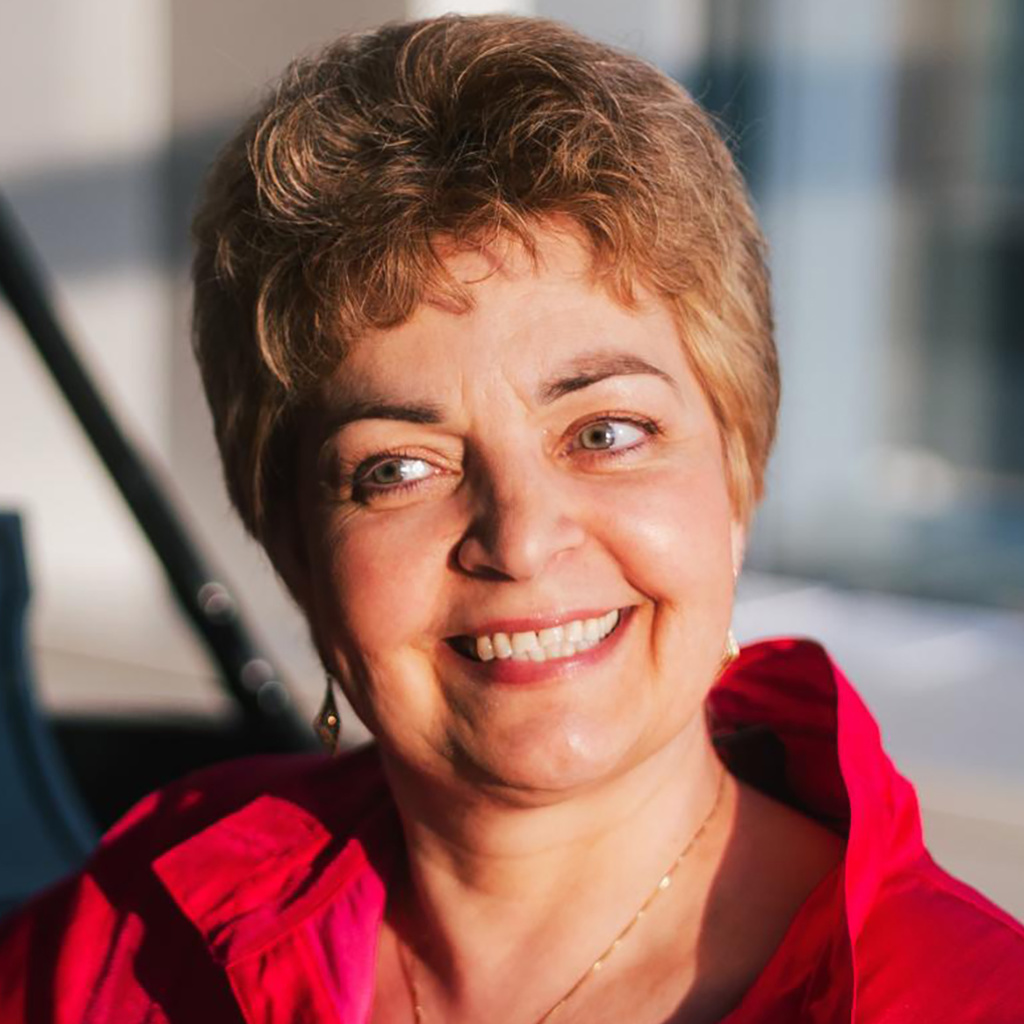
Ksenia Nosikova

Tammie Walker
Practice and perform
Need to book a music room, request an accompanist, check out audition information, rent a locker, or use a recording studio? Visit the Music Callboard for all scheduling and policy information.
